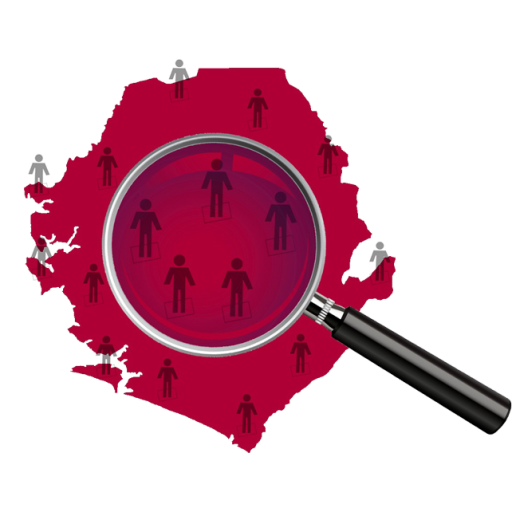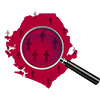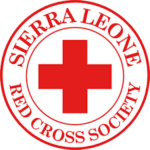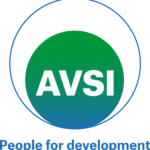TERMS OF REFERENCE FOR THE ENGAGEMENT OF A LOCAL CONSULTANT
Job Overview
-
Date PostedApril 5, 2024
-
Location
-
Expiration dateApril 18, 2024
-
Experience5 Years
-
GenderBoth
-
QualificationBachelor Degree, Master’s Degree
-
OrganizationNETWORK OF HIV POSITIVES IN SIERRA LEONE (NETHIPS)
-
Required LanguagesEnglish
Job Description
| SHARING HIV ACTIONS, RESULTS AND EXPERIENCES FOR DECISION (SHARE) PROJECT
TERMS OF REFERENCE FOR THE ENGAGEMENT OF A LOCAL CONSULTANT ON KNOWLEDGE GENERATION |
| Country | Sierra Leone |
| hiring organization | NETWORK OF HIV POSITIVES IN SIERRA LEONE (NETHIPS) |
| number of consultants required | One (1) |
| number of consultancy days | 35 days (between may-june 2024) |
| application open date | 4th April 2024 |
| application closing date | 18TH APRIL 2024 |
| application submission guideline | Applications should be sent by email to: idmsongo@gmail.com ; nethips2006@yahoo.com with “Application for Consultancy – Knowledge Generation on Solthis Projects’’ indicated as the email subject |
Executive Summary
1 Introduction to the project partners 2
2 Presentation of the projects 2
2.1 Summary of the SHARE project 2
2.2 SHARE Project objectives 3
2.3 Project’s main activities for knowledge generation 3
2.4 Project partners and beneficiaries 4
3 Purpose of the consultancy 4
3.2 Process and methodology of the support 5
Introduction to the project partners
Solthis (Solidarité thérapeutique et Initiatives pour la Santé / Therapeutic Solidarity & Initiatives for Health) is an international NGO whose objective is to improve prevention and access to quality health care through health system strengthening in countries where it operates. Solthis was created in 2003 by medical researchers from the Pitié-Salpêtrière Hospital. Solthis’ actions rely on a sustainable development approach to address public health issues in resource-limited countries, through:
- A scientific and empirical approach to find cost-effective solutions adapted to the realities on the ground
- Mobilizing multidisciplinary experts from Northern and Southern countries in order to address all dimensions of health issues: medical, social, economic or political
Solthis operates through three modes of intervention: capacity building, operational research and advocacy (www.solthis.org).
NETHIPS is a key stakeholder and an umbrella organization for People Living with HIV (PLHIV) in Sierra Leone. Founded in 2006, its strategic role is to coordinate, advocate and build the capacity of its members who are mainly people living with and affected by AIDS in Sierra Leone.
NETHIPS works to mitigate the impact of HIV on people infected and those affected. Its Vision is a Sierra Leone where people living with HIV (PLHIV) and their dependents enjoy equal rights and opportunities and live productive, dignified and meaningful lives. The organization works to improve access to and utilization of antiretroviral therapy, give human face and voice to HIV and AIDS by ensuring meaningful representation and involvement of PLHIVs in relevant fora locally and internationally, facilitate the improvement of HIV related policies, laws and practices that uphold human rights and welfare of the PLHIV community in Sierra Leone (www.nethips.org).
-
Presentation of the projects
-
Summary of the SHARE project
-
Project context
In mid-2023, Solthis signed with the French Development Agency (AFD) Group a new grant for Partnerships to Improve Population Health in West Africa (CPP) implemented in 5 countries. Within this grant is the Sharing HIV Actions, Results and Experiences for Decision (SHARE) Project in Sierra Leone, led by Solthis in partnership with NETHIPS. The period of implementation of the project is from November 2023 to June 2025 in partnership with NETHIP. The project iaims to influence HIV response in the country through generation, documentation, dissemination, advocacy for adoption/adaptation and application of lessons learned to.
The project is focusing on knowledge generation and dissemination exploring two specific components: (1) service delivery and (2) community engagement. The knowledge generation and dissemination will explore two past projects: Empowering patients and Health care Workers for Comprehensive and Effective HIV Care (EMPOWER I) and Program for Strengthening Health Services and Systems (PROSSAN I) and two current projects: Global Fund New Funding Model 3 (NFM3) and PROSSAN II.
Knowledge generation on service delivery will explore how Solthis capacity building technical assistance (training, coaching/mentorship) are impacting the quality of HIV care. Knowledge generation on community engagement will explore the role of Support Groups (SGs) in promoting retention in care and adherence to treatment for HIV Recipients of Care (RoCs) under the umbrella of NETHIPS.
-
Summary of Solthis current and past projects for knowledge generation – Empower, PROSSAN and NFM3
(i) Empower I and II – Empower I, implemented from June 2016 to February 2019, aimed to contribute to the strengthening of civil society and healthcare teams for PLHIV to exercise their right to health in the country. The Empower I project appeared to have a significant impact on both PLHIV and the health system itself. Among the significant benefits observed at the end of Empower I were the increase in retention of patients in HIV care, an improved adherence to treatment of PLHIV as well as a higher quality of care score for all facilities targeted by the project.
Empower II, implemented from March 2019 to February 2022, aimed to consolidate and sustain the achievements of the 1st phase of the project in terms of HIV quality of care and empowerment of users. It focused on a patient-oriented, quality-focused, and needs- based care to people living with HIV, by strengthening the capacities of healthcare teams and promoting the rights of users of health services. The project supported health workers capacity building in 13 selected health facilities in Western Are Urban, Western Area Rural and Port Loko, and supported NETHIPS to strengthen 20 SGs in the same districts.
(ii) PROSSAN I and II – PROSSAN I, implemented from 2019 to 2022 in a consortium led by Action Against Hunger, aimed to contribute to the strengthening of health systems in three countries (Sierra Leone, Ivory Coast and Liberia) and to put women and young people at the heart of decision-making processes regarding their health. In its role, Solthis supported 22 primary healthcare facilities from Western Urban and Rural Areas, on the integration of HIV care and management into reproductive, maternal, newborn, child and adolescent health (RMNCAH) services by strengthening the capacity of Health Care Workers through supportive supervisions, on-site and classroom training and clinical mentoring. The capacity strengthening focused on HIV Testing and Counseling (HTC); Elimination of Mother-to-Child Transmission (eMTCT) and Early Infant Diagnoses (EID); Adolescent and Young People Friendly service provision; adult and pediatric HIV care; TB/HIV coinfection management; Treatment failure and Opportunistic Infections (OI); and adherence and disclosure. Under the current PROSSAN II project, Solthis is supporting the aforementioned interventions in 10 primary healthcare facilities, with implementation period from May 2022 to May 2024
(iii) Global Fund NFM 3- Currently, Solthis is supporting the implementation of the NFM3 project to accelerate the achievement of 95-95-95 targets for HIV testing, treatment and viral load suppression in Sierra Leone by 2024 through a Technical Assistance to the National HIV/AIDS Control Program (NACP) in 7 districts. Solthis provides support to 35 health facilities in 7 districts (Western Area Rural, Western Area Urban, Port Loko, Bombali, Tonkolili, Bo and Kenema).
SHARE Project objectives
SHARE project objectives are to:
- Contribute to the body of knowledge on HIV/AIDS by generating and disseminate knowledge on serve delivery and community engagement support provided by Solthis and its partner NETHIPS.
- Contribute to increasing and maintaining community engagement in HIV response to support people living with HIV in Sierra Leone.
- Contribute to approaches for increasing health workers capacity on the provision of HIV treatment and are services
- Advocate for policy and strategy changes in Sierra Leone by sharing knowledge on initiatives that impact good adherence and care retention (2nd and 3rd 95s) through the work of SGs.
- Support the need for resource mobilization to allow full and scaled community participation and contribution in HIV response.
Project’s main activities for knowledge generation
SHARE project will carry out the following activities in support of the knowledge generation:
- Review and analysis of existing data and information: This will focus on the Empower, PROSSAN and NFM3 projects. Review of project proposals, reports, evaluation, lessons learning exercises and/or tools to extract relevant information to feed expected knowledge generation on service delivery and community engagement activities.
- Service delivery: Lessons learning process focusing on Solthis capacity building approaches, using focused group discussions and key informant interviews for health care workers and health managers involved in HIV care at the health facility, district and national levels.
- Community engagement: Lessons learning process focusing on the experience and based on stakeholders’ lived experiences, using focused group discussions and key informant interviews with RoCs, support group coordinators, health facility workers, health managers, implementing partners and donors, to explore the complementarity of community and health facilities support.
Project partners and beneficiaries
The key partners involved in the SHARE project are:
- Solthis as the Lead Partner
- The civil society organization, NETHIPS, a consortium partner
- The Ministry of Health, through the National HIV/AIDS Control Program (NACP), which supports the general coordination and supervision of the project.
The direct beneficiaries of the SHARE project are:
- NETHIPS, which coordinates and provides technical support to the activities of Support Groups (SGs).
- Recipients of Care (RoCs), including SG leaders and their members.
- The health care teams/workers providing care to RoCs
- Health authorities at the district and national levels, including the District Health Management Team (DHMT) and national authorities (supervisors of the National HIV/AIDS Control Program of the Ministry of Health and Sanitation, staff of the District Health Management Team), involved in coordination of the HIV response.
-
Purpose of the consultancy
3.1 Consultancy Tasks
The Consultant will carry out the following specific tasks on knowledge generation involving community engagement and service delivery stakeholders (please see 2.3 above) through the following specific tasks:
- Develop KII and FGD guides, including consent forms.
- Develop training materials for the training of data collectors and data supervisors using qualitative methods, specifically Key Informant Interviews (KIIs) and Focused Group Discussions (FGDs).
- Conduct 5 days training for data collectors and data supervisors on the data collection methodology, including practical sessions on facilitation of interview sessions, note taking, audio recording of sessions and transcription of interview recordings.
- Conduct 9 KIIs on community engagement at national level and support data supervisors to conduct 10 KIIs in the districts.
- Review transcribed notes from data supervisors on FGDs and KIIs conducted/supervised by them data for quality and accuracy.
- Ensure the confidentiality of all information provided by KII and FGD participants.
- Analyze community engagement KIIs and FGDs based on guidance provided by Solthis and NETHIPS, and prepare reports on key lessons identified and recommendations from stakeholders.
KIIs and FGDs plan for the service delivery component
-
- Fourteen (14) FGDs (2 FDGs per district, with 8 to 10 health care workers per FGD). The FDGs will be conducted in the 7 districts of Western Area Rural, Western Area Urban, Port Loko, Bombali, Tonkolili, Bo and Kenema, where Solthis implemented capacity-building activities. Selection will be based on health care workers that are involved in HIV care and have benefited from Empower (3 districts) and/or NFM3 and PROSSAN project (7 districts). When feasible, Solthis and NETHIPS will ensure gender balance in the selection of participants. For each district, the 2 FGD discussion will be composed of different HIV health care workers (from different wards), as follow: Nurses, midwives, HIV counsellor, CHOs providing care to RoCs, pharmacists/pharmacy technicians, lab technician, and data clerks.
- One (1) FGD with Solthis staff involved in capacity building activities during Empower, NFM3 and/or PROSSAN projects.
- Eleven (11) KIIs, including 4 KIIs at the national level (NACP/NAS) and 7 KIIs (with the 7 district HIV supervisors in the 7 districts mentioned above)
KIIs and FGDs plan for the community engagement component
A total of 11 FGDs will be conducted in the 3 districts where NETHIPS supported SG activities during Empower project. Each FGD have 8 to 10 participants. Where feasible, FGD participants will be gender balanced.
- Five (5) FGDs with support group members (Expert client, mother mentor, SG leaders, peer educators) that actively conducted SG sessions to RoCs:
- 1 FGD in Port Loko District gathering Lunsar, Masiaka and Port Loko hospital related SG members.
- 2 FGD in Western area rural and urban considering their geographic location and gathering Grafton,
Goderich, Chest, Kissy, Rokupa SG members
- 2 FGD in Western area urban gathering 34 Military hospital, King Harman, Police hospital, George
Brook, Wellington SG members
- Five (5) FGDs with RoC who have benefited from support group activities on adherence and care retention. For children and adolescent, parents and/or care givers could be included in the focus group to express their specific experience as compared to adults’ support:
- 1 FGD in Port Loko District gathering Lunsar, Masiaka and Port Loko hospital related RoC.
- 2 FGD in Western area rural and urban considering their geographic location and gathering Grafton,
Goderich, Chest, Kissy, Rokupa RoC
- 2 FGD in Western area urban gathering 34 Military hospital, King Harman, Police hospital, George
Brook, Wellington RoC
- One (1) FGD with health care workers from health facilities who have been collaborating with SGs supported during Empower projects.
- Twelve (12) KIIs: 2 KIIs at national level (NACP/NAS), 1 KII with UNAIDS, 1 KII with NETHIPS management, 3 KII with district HIV supervisors involved in Empower project (Western area rural, urban and Port Loko) and 5 KII with selected HIV implementing partners.
3.2 Process and methodology of the support
A panel composed of representative of Solthis and NETHIPS will select the Consultant. The panel will be responsible for:
- Reviewing the different applications and selecting the one that most closely matches the expectations expressed in the present terms of reference
- Discussing with the consultant during inception meetings, to clarify expectations and provide relevant documents and contacts to the consultant
- Reviewing the deliverables produced by the consultant
The activity managers for this consultancy isNETHIPS Program Manager. All enquiries by the selected Consultant should be directed to him.
3.3 Expected deliverables
- Inception report: The report should contain a summary of discussions and decisions reached during inception meetings and an updated version of the technical proposal submitted by the Consultant in his/her application. The report should also contain revised activity timelines. After the pre-framing meeting, the consultant(s) will be asked to submit an inception report of no more than 8 pages, which could be an updated version of the technical proposal submitted during the application process. It will include the initial mission scoping discussions and will aim to ensure mutual understanding of the objectives, plan of actions and timeline for conducting the capitalization project.
- Guides for FGD and Kii for service delivery and community engagement, including consent forms
- Consultancy report: At the end of the consultancy, the Consultant will submit draft report to the activity managers for review and feedback, in a format mutually agreed by the Consultant and the activity managers. The Consultant will then finalize the report based on the inputs and feedback provided. Up to two levels of review may be required for finalization of the report. The report will focus on analysis and findings from community engagement KIIs and FGDs only, while Solthis will analyze findings from service delivery KIIs and FGDs, as this will be handled by Solthis.
- PowerPoint presentation: The Consultant will submit alongside its consultancy report report a PowerPoint presentation summarizing the key elements of the consultancy, including methodology, results, summary of lessons learned and recommendations.
- Activity pictures: Labelled sharp activity pictures should be included in the consultancy report and PowerPoint presentation, in addition to submitting the pictures as separate jpeg files.
How to apply:
Skills and experience;
The required minimum qualifications for the Consultant are:
- At least 5 years proven experience in qualitative data collection and analysis on FDG and KII in Sierra Leone.
- Master’s Degree in public health, sociology, development studies or other training related to the consultancy
- Good understanding of the health sector, including HIV, health facility service delivery, community health service delivery, and civil society work in HIV/AIDS
- Excellent analytical, synthesis and facilitation skills.
- Experience of working with national, regional and international partners and civil society.
- Willingness to work collaboratively with data collectors, NETHIPS, Solthis and other stakeholders involved in the project.
- Ability to interact with the project beneficiaries and maintain confidentiality of data and information collected.
- Good verbal and written communication skills in English Language. Good verbal communication in Krio language will be an added advantage.
Application package:
Interested candidates are required to submit a file containing the following mandatory elements:
A technical proposal containing:
- The detailed CV of the applicant
- Three (3) relevant references or samples of similar assignments successfully conducted.
- A technical proposal (maximum 8 pages), demonstrating/including the following:
- A good understanding of the terms of reference
- A methodological proposal
- Measure to ensure confidentiality of information collected
- A proposed timetable/work plan including consultancy task and deliverables
- Any other information deemed relevant by the applicant to the application.
A financial offer including :
- The complete estimate of the consultancy in Leones, inclusive of all taxes including VAT, reflecting all the phases of the consultancy Additional expenses such as transportation cost, training cost and accommodation outside Freetown will be managed by NETHIPS/Solthis.
Submission process:
Deadline for submission of application is 18TH APRIL 2024.
The submission package must include all the information specified in these terms of reference and be sent in PDF format to the following email address:
- REF : Application for Consultancy – Knowledge Generation on Solthis Projects
- Email: : idmsongo@gmail.com ; nethips2006@yahoo.com
Applicants should please note that failure to comply with the application guidelines will lead to rejection of application by the selection committee.
-
Selection and allocation
-
Criteria
The following criteria will be used to evaluate proposals:
- Quality and clarity of the technical proposal
- Quality and value for money of the financial proposal
The following analysis grid will be used by at least 2 evaluators:
| Criteria objectively assessed | Maximum Score | Comments | Note | Total |
| Experiences and skills | 50 | 0 | ||
| Professional experience of the consultant in relation to the consultancy | 35 | 0 | ||
| Academic background of the consultant in relation to the consultancy | 15 | 0 | ||
| Methodology used / planning | 30 | 0 | ||
| Consistency of the technical proposal in relation to the order (timetable/work plan, methodological approach, understanding of TORs, confidentiality) | 20 | 0 | ||
| Inclusion of expected deliverables in an appropriate manner | 10 | 0 | ||
| Financial offer | 20 | 0 | ||
| Detailed and competitive financial offer | 20 | 0 | ||
| TOTAL | 100 | 0 |







